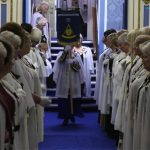Since the inception of social media and easy access to mobile data, almost nothing is left inaccessible. You can find a tutorial on almost any subject, see your friend’s holiday photos in an instant, order items from anywhere in the world and do extensive research of many opinions, denominations, age and statistics. As the cultural mindset of humanity changes, so too, do we find an urgency for transparency and clarity. It is therefore not surprising that Freemasonry seems to be back in the spotlight.
This BBC video published on 8 November 2017 on their YouTube channel, offers viewers a rare glimpse into the workings of Freemasonry. What makes this short documentary even more unique, is that it is about women Freemasons.
Many people are under the impression that only men can become Freemasons. In some countries, even male Freemasons aren’t always aware that women can join the order. But the history of women in Freemasonry stems back over a hundred years, with Freemasonry itself having its first Grand Lodge established in London in 1717 and some of the oldest known documentation with the history of Freemasonry, dates between 1390 and 1425, which in turn references the ‘craft of masonry’ having its origins dating back to the 3rd century BC.
It is therefore natural that people would assume that everything about Freemasonry, should by now, be exposed, with very little mystery left unturned. Yet, Freemasonry has maintained a high level of privacy and it therefore continues to be tainted by naysayers and branded by many individuals as a ‘dark occult with secrets, cloaked in corruption’.
The reporter in the BBC video is seen starting her visit to the women’s lodge with an expression of apprehension and continues to refer to Freemasonry as a ‘secret organisation’. On closing of the documentary, she states that in order to shake the negative reputation of corruption and to gain more members, that Freemasonry may need to be more transparent in future. In lieu of this closing statement, I would like to take the opportunity of correcting some terminology and also to educate.
Describing Freemasonry with the term “secret organisation” stands to be corrected. It’s not an organisation that no-one knows about. Our lodges aren’t hidden and we don’t meet in secret or undisclosed locations. I have found it interesting that humanity tends to associate the word ‘secret’ with ‘things they should not know’ or ‘things that should be exposed’. Having a ‘secret’ in itself, almost demands a negative connotation and is generally met with hesitance and sometimes, even with aggression. So then, if we’re not a secret organisation, you might then describe Freemasonry as an organisation with secrets.
But let’s look at secrets with a little more understanding. All governments have secrets and your access to those secrets would be security level clearance dependent. Every large corporate also has secrets which they protect against competitors. Some research institutions keep their secrets closely guarded so as to protect people from other people who have no understanding of how to use data.
Freemasonry certainly has secrets and here’s why: our secrets are designed as a continual test of our integrity. Honour and integrity are some of the key characteristics that Freemasons highly prize. Any individual that therefore joins Freemasonry, is therefore given the opportunity to develop him/herself in a continual ‘self-check’ environment. Disclosing a masonic secret is a sure indicator to yourself of your own inability of being a trustworthy individual. There are no ‘secrets’ in Freemasonry having any bearing other than self-analysis and even those ‘secrets’ are freely available on the internet, if one has the ability to disregard the misinformation posted by those who entertain conspiracy theories.
Transparency regarding our organisation including our goals, aims and ‘modus operandi’ has more to do with becoming more visible in the public eye, than the focus around secrecy. In example: The Red Cross is a very well-known international organisation, who extensively market their goals and aims, and yet the public at large do not have access to their ‘secrets’ such as donors who demand anonymity and is respected as such.
In essence, Freemasonry can do more marketing to dispel the current myth and rumours surrounding the organisation, but it can not lose one its pillars which focusses on self-improvement by removing the test of integrity and confidentiality of the individual.
Written by: Bro. Voermans
Sources:
https://en.wikipedia.org/wiki/History_of_Freemasonry
the secret world of female Freemasons – BBC News – Video







